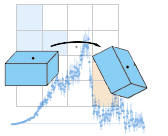
| HOME | PEOPLE | RESEARCH | ACADEMICS | TRAVEL/VISITORS | LINKS | CONTACT |

|
Web Mail
Mailing Lists
Computing Resources
Site Map
Adaptive Nonlinear Control: Stability and Performance
Miroslav Krstic, Department of Electrical and Computer Engineering, UC Santa Barbara
Tuesday, May 17, 199412:00 PM to 1:00 PM
Thomas 306
Traditional (certainty-equivalence) approach to adaptive control is not applicable to nonlinear systems. It relies on the fact that linear instability mechanisms are no faster than convergence rates of parameter estimators. In contrast, the instability phenomena in truly nonlinear systems have explosive character -- the state can escape to infinity in finite time. Therefore, an adaptive controller for nonlinear systems must have either 1) a parameter estimator as fast as the nonlinear instability phenomena, or 2) a strong controller which prevents incorrect, time-varying parameter estimates from causing finite escape.
These two ideas are at the basis of our two approaches to adaptive nonlinear control. The tuning functions approach interlaces the design of the controller and the identifier, and, using a single Lyapunov function, guarantees that the speed of adaptation follows the speed of nonlinear instability phenomena. In contrast, the estimation-based approach employs stronger controllers to achieve a controller-identifier separation in which any slow estimator can be used.
Analytical quantification and practical improvement of transient performance have been long-standing problems in adaptive control. The traditional adaptive linear controllers can go through unpredictably large initial swings before they settle to a good asymptotic behavior. The utmost accomplishment of our nonlinear adaptive designs is their capability to systematically improve both the ${\cal L}_\infty$ and the ${\cal L}_2$ norms of transient responses, which we show analytically. The most interesting consequence is that for the first time we can prove that an adaptive controller achieves better performance than its nonadaptive counterpart.
|
©2003-2011 California Institute of Technology. All Rights Reserved webmaster |
|